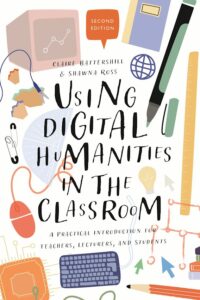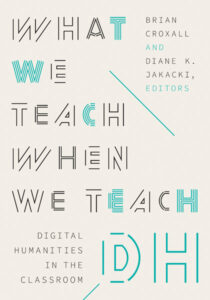DH Pedagogy
 Using Digital Humanities in the Classroom, written by Claire Battershill and Shawna Ross, is the go-to guide to using digital tools and resources in the Humanities classroom. The book is rooted in the day-to-day experience of teaching, and written for those without specialist technical knowledge.
Using Digital Humanities in the Classroom, written by Claire Battershill and Shawna Ross, is the go-to guide to using digital tools and resources in the Humanities classroom. The book is rooted in the day-to-day experience of teaching, and written for those without specialist technical knowledge.
Using Digital Humanities also offers a Digital Companion that has been designed to answer commonly asked questions quickly and clearly.
DH Course Randomizer
The Digital Companion site to Using Digital Humanities in the Classroom offers a DH Course Randomizer for users to easily generate a multimodal DH course plan and view how it scores for synchronicity, active learning, and teacher effort.
 What We Teach When We Teach DH: Digital Humanities in the Classroom, edited by Brian Croxall and Diane K. Jakacki, highlights how DH can transform learning across a vast array of curricular structures, institutions, and education levels, from high schools and small liberal arts colleges to research-intensive institutions and postgraduate professional development programs. This book brings together leading DH scholars to present the following articles:
What We Teach When We Teach DH: Digital Humanities in the Classroom, edited by Brian Croxall and Diane K. Jakacki, highlights how DH can transform learning across a vast array of curricular structures, institutions, and education levels, from high schools and small liberal arts colleges to research-intensive institutions and postgraduate professional development programs. This book brings together leading DH scholars to present the following articles:
- Part I. Teachers
- "Born-Pedagogical DH: Learning While Teaching" by Emily McGinn and Lauren Coats
- "What Do We Want from the Standard Core Texts of the Digital Humanities Curriculum?" by Gabriel Hankins
- "Teaching the Digital Humanities to a Broad Undergraduate Population" by Alison Langmead and Annette Vee
- "Teaching Digital Humanities: Neoliberal Logic, Class, and Social Relevance" by James O’Sullivan
- "Teaching from the Middle: Positioning the Non–Tenure Track Teacher in the Classroom" by Jacob Heil
- "Why (in the World) Teach Digital Humanities at a Teaching-Intensive Institution?" by Rebecca Frost Davis and Katherine D. Harris
- Part II. Students
- "Digital Humanities in General Education: Building Bridges among Student Expertise at an Access University" by Kathi Inman Berens
- "(Hard and Soft) Skills to Pay the Bills: A Both/And Approach to Teaching DH to Undergraduates" by Jonathan D. Fitzgerald
- "Digital Humanities across the Curriculum, or How to Wear the Digital Halo" by Scott Cohen
- "Rethinking the PhD Exam for the Study of Digital Humanities" by Asiel Sepúlveda and Claudia E. Zapata
- "Pedagogy First: A Lab-Led Model for Preparing Graduate Students to Teach DH" by Catherine DeRose
- "What’s the Value of a Graduate Digital Humanities Degree?" by Elizabeth Hopwood and Kyle Roberts
- Part III. Classrooms
- "Codework: The Pedagogy of DH Programming" by Harvey Quamen
- "Community-Driven Projects, Intersectional Feminist Praxis, and the Undergraduate DH Classroom" by Andie Silva
- "Bringing Languages into the DH Classroom" by Quinn Dombrowski
- "DH Ghost Towns: What Happens When Makers Abandon Their Creations?" by Emily Gilliland Grover
- "How to Teach DH without Separating New from Old" by Sheila Liming
- "The Three-Speed Problem in Digital Humanities Pedagogy" by Brandon Walsh
- Part IV. Collaborations
- "Sharing Authority in Collaborative Digital Humanities Pedagogy: Library Workers’ Perspectives" by Chelcie Juliet Rowell and Alix Keener
- "K12DH: Precollege DH in Historically Underprivileged Communities" by Laquana Cooke and Andrew Famiglietti
- "A Tale of Two Durhams: How Duke University and North Carolina Central University Are Increasing Access and Building Community through DH Pedagogy" by Hannah L. Jacobs, Kathryn Wymer, Victoria Szabo, and W. Russell Robinson
- "Expanding Communities of Practice through DH Andragogy" by Lisa Marie Rhody and Kalle Westerling
- "What Is Postcolonial DH Pedagogy, and What Is It Doing in Nonhumanities Institutions? Case Studies from India" by Dibyadyuti Roy and Nirmala Menon
- "Finding Flexibility to Teach the “Next Big Thing”: Digital Humanities Pedagogy in China" by Lik Hang Tsui, Benjun Zhu, and Jing Chen
- "What Is Digital Humanities and What’s It Doing in the Classroom?" by Brian Croxall and Diane K. Jakacki
#DLFteach Toolkits are openly available, peer-reviewed lesson plans and concrete instructional strategies developed by the DLF Digital Library Pedagogy Group (#DLFteach).
All lessons include learning goals, preparation, and a session outline. Additional materials—including slides, handouts, assessments, and datasets—are hosted in the DLF Open Science Framework (OSF) repository as well as linked from each lesson.
Digital Pedagogy in the Humanities: Concepts, Models, and Experiments
Digital Pedagogy in the Humanities, hosted by the Modern Language Association and Humanities Commons, is a curated collection of reusable and re-mixable resources for teaching and research. Organized by keyword, the annotated artifacts can be saved in collections for future reference or sharing. Each keyword includes a curatorial statement and ten artifacts that exemplify that keyword.
Index for the introduction to the collection, "Curating Digital Pedagogy in the Humanities":
1. Getting Started and Overview
-
-
- Why "Digital Pedagogy"?
- Why a Digital Format?
- What's in This Collection?
-
-
-
- Openness
- Collaboration
- Play
-
- Practice
- Student Agency
- Identity
-
-
- BUT . . . FERPA!
- BUT . . . I don’t have time!
- BUT . . . where do I start?
- BUT . . . how do I scaffold?
-
- BUT . . . what about grading?
- BUT . . . what if my students are resistant?
- BUT . . . does digital pedagogy count?
- BUT . . . this all sounds daunting!
4. History of the Development of Digital Pedagogy in the Humanities
-
-
- Digital Pedagogy within Digital Humanities
- Digital Pedagogy beyond Digital Humanities
- Digital Pedagogy Struggling to Find Its Voice within Digital Humanities
- Scholarly Infrastructure for Digital Pedagogy
- Pedagogical Materials as Scholarship
-
5. Digital Pedagogy in the Humanities Structure and Approach
-
-
- Keywords
- Tagging
- Editing in Public via GitHub
-
- Working with Open Peer Review
- Shifting the Concept of “Published”
- The Shifting Role of “Publisher”
